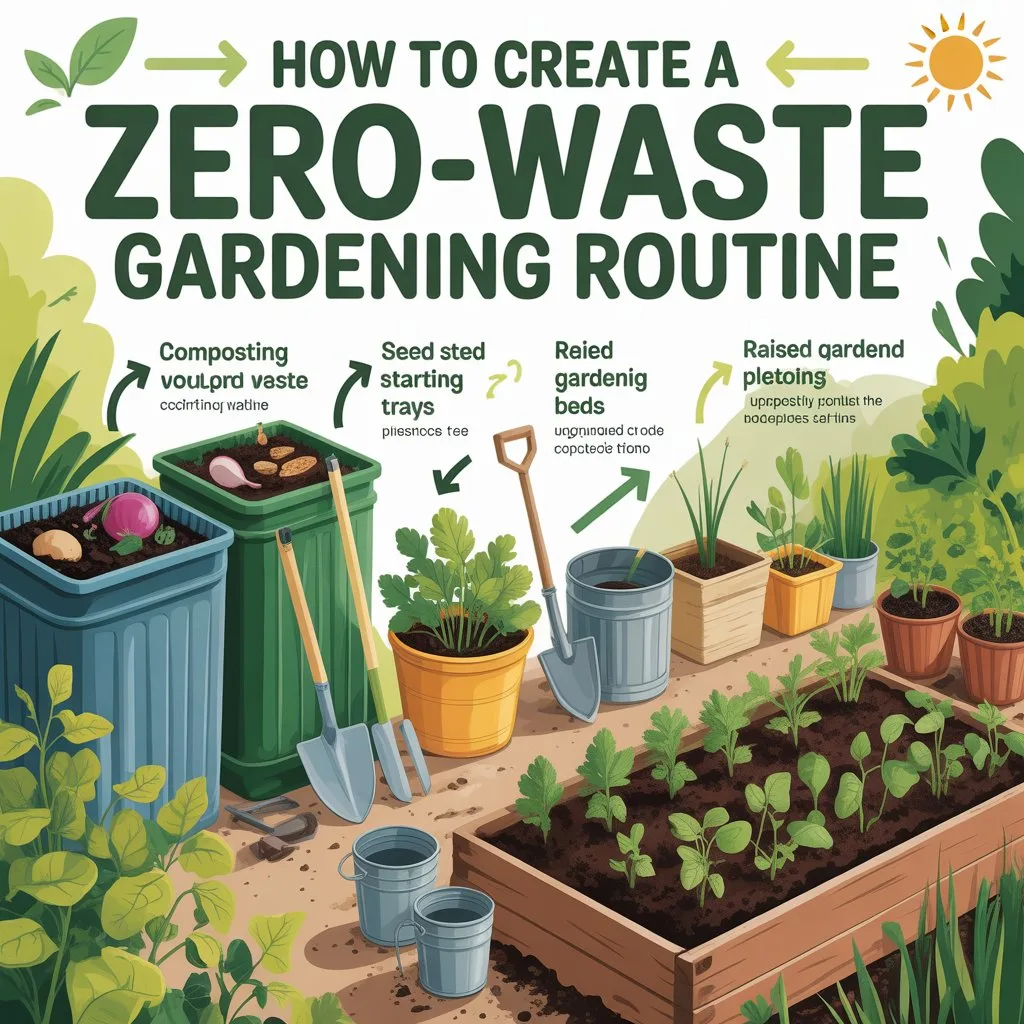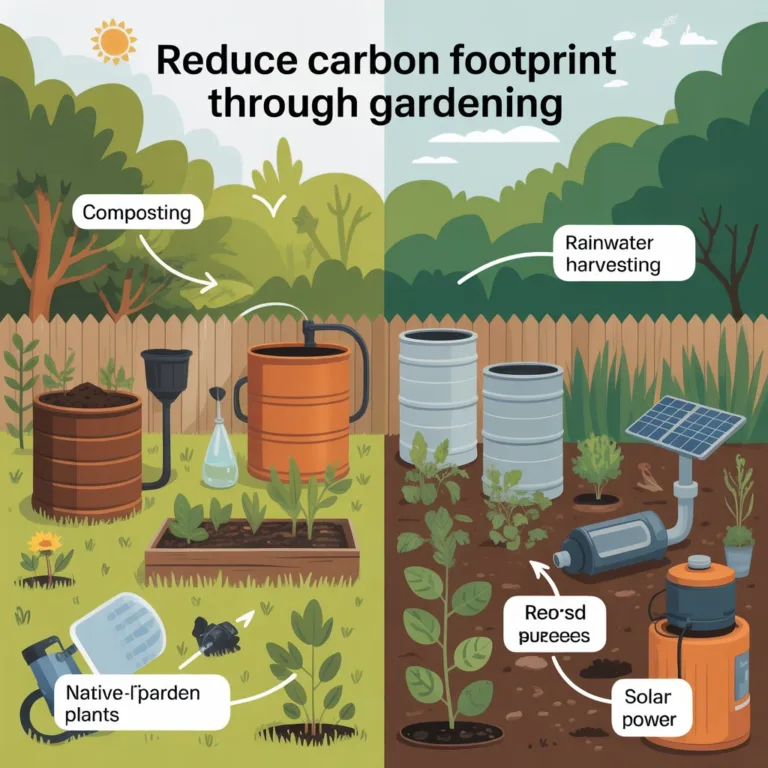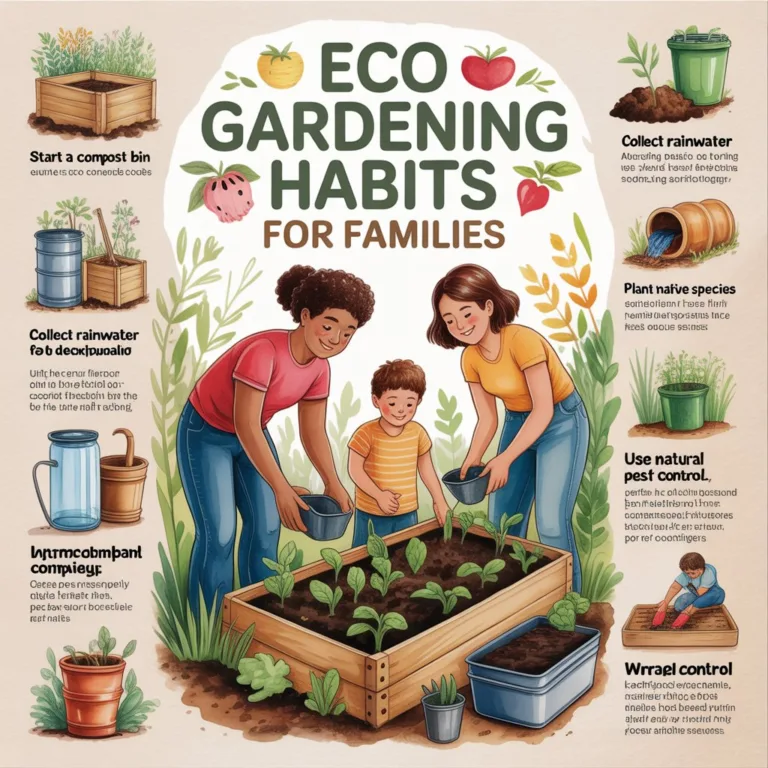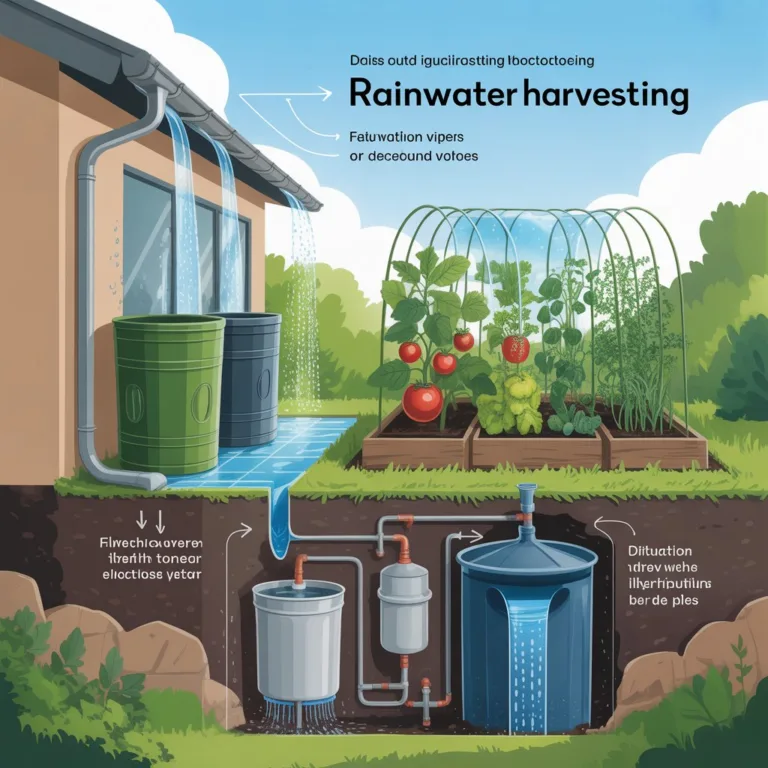Creating a garden that thrives while generating minimal waste is not only rewarding but also a powerful way to live sustainably. A zero-waste gardening routine focuses on reusing, recycling, and reducing what would normally be discarded — transforming kitchen scraps, old containers, and natural materials into valuable resources for plant growth. This approach benefits both the environment and the gardener, creating a self-sustaining ecosystem where every element serves a purpose.

Developing such a routine doesn’t require specialized tools or costly materials. It’s about changing habits, using what’s available, and approaching gardening as a closed-loop system. Whether you’re a beginner or an experienced gardener, zero-waste gardening allows you to nurture the earth while reducing your carbon footprint and saving money along the way.
Understanding the Concept of Zero-Waste Gardening
Zero-waste gardening is grounded in the idea that nothing in nature truly goes to waste. Every fallen leaf, decomposed branch, and dried seed contributes to the cycle of life. In this same spirit, a zero-waste garden operates by mimicking natural systems — minimizing external inputs, repurposing materials, and returning nutrients to the soil.
This approach aims to eliminate waste at every stage, from planting to harvesting. Instead of throwing away old soil bags or disposing of food scraps, these materials become valuable assets for composting, mulching, or propagation. The ultimate goal is to create a balanced, resilient garden that sustains itself and reduces dependence on manufactured products.
Benefits of a Zero-Waste Gardening Routine
Building a zero-waste gardening routine offers benefits that go far beyond waste reduction.
- Environmental Preservation – By reusing and recycling materials, you decrease landfill waste and reduce pollution caused by manufacturing and disposal processes.
- Soil Health – Composting organic waste and using natural fertilizers improve soil fertility and biodiversity.
- Cost Efficiency – Making use of everyday waste materials saves money on gardening supplies.
- Self-Sufficiency – Growing your own food and managing your garden sustainably fosters independence from commercial systems.
- Mindful Living – Practicing zero-waste gardening encourages awareness of how small daily actions impact the planet.
These benefits make zero-waste gardening a meaningful lifestyle shift, not just a gardening method.
Building the Foundation for a Waste-Free Garden
Before diving into composting or reusing materials, it’s important to establish a sustainable structure. A zero-waste garden begins with thoughtful design and conscious material choices.
Choose Recycled or Natural Materials
Whenever possible, opt for recycled containers, wooden planters, and repurposed garden tools. Old buckets, crates, or even broken furniture can be turned into planting spaces. Bamboo stakes or natural twine can replace plastic supports and ties.
Use Local and Organic Resources
Reduce transportation emissions by sourcing seeds, soil, and mulch from local suppliers. If you can, trade cuttings or seeds with neighbors to diversify your garden naturally.
Focus on Perennial Plants
Perennial herbs, vegetables, and flowers regrow each year, reducing the need for constant replanting. This minimizes seed waste and supports long-term soil stability.
Plan for Efficiency
Design your garden to optimize space, water flow, and sunlight exposure. Group plants with similar water and light needs together to reduce overwatering and resource waste.
Composting: The Heart of Zero-Waste Gardening
Composting is the cornerstone of any zero-waste gardening routine. It transforms organic waste into rich, nutrient-filled soil that feeds your plants naturally.
Kitchen scraps, dried leaves, grass clippings, and paper materials can all be composted. The key is maintaining the right balance between “greens” (nitrogen-rich materials like food waste) and “browns” (carbon-rich materials like dry leaves and cardboard).
Some effective composting methods include:
- Traditional Compost Piles: Ideal for larger spaces, where you can layer materials in a bin or open pile.
- Vermicomposting: Uses worms to break down waste efficiently, producing nutrient-rich worm castings perfect for small gardens or balconies.
- Bokashi Composting: A fermentation-based method that works well for kitchen scraps, including cooked food and dairy products.
Regularly turning your compost and keeping it slightly moist accelerates the process, resulting in dark, crumbly compost that revitalizes your soil without synthetic fertilizers.
Reusing and Recycling Everyday Materials
A zero-waste gardening routine thrives on creativity and resourcefulness. Many household items that are typically thrown away can be repurposed for gardening use.
Recycled Containers
Old yogurt tubs, tin cans, or glass jars can serve as seed starters or small planters. Just ensure proper drainage holes to prevent water buildup.
Plastic Bottles and Jugs
Cut large bottles into drip irrigation systems, watering funnels, or protective covers for young plants. They help regulate moisture and protect seedlings from pests.
Cardboard and Paper
Uncoated cardboard and shredded paper are excellent for composting and mulching. They suppress weeds, retain soil moisture, and eventually decompose into organic matter.
Broken Tools and Furniture
Instead of discarding damaged garden tools, repurpose their parts. Wooden handles can be used for plant markers, while metal components may serve as supports or trellises.
This cycle of reuse not only prevents waste but also infuses your garden with creativity and character.
Water Conservation in Zero-Waste Gardening
Water is a precious resource, and zero-waste gardeners prioritize its efficient use. Conserving water reduces strain on the environment and ensures sustainable gardening practices.
Collect Rainwater
Rain barrels or simple collection systems can store water for future use. This reduces reliance on municipal water supplies and provides naturally soft water ideal for plants.
Mulching
Applying mulch made from leaves, straw, or compost retains moisture and regulates soil temperature. It also prevents erosion and suppresses weeds naturally.
Drip Irrigation Systems
DIY drip irrigation made from recycled plastic bottles or tubing delivers water directly to plant roots, minimizing evaporation and runoff.
Watering Timing
Watering in the early morning or late evening reduces evaporation losses, allowing plants to absorb moisture more effectively.
Combining these methods can significantly reduce water waste while promoting healthier, more resilient plants.
Natural Fertilizers and Pest Control
Zero-waste gardening avoids chemical fertilizers and pesticides, favoring natural alternatives that protect the environment and human health.
Homemade Fertilizers
Compost tea, made by steeping compost in water, provides a nutrient boost for plants. Similarly, banana peels, eggshells, and coffee grounds enrich soil with potassium, calcium, and nitrogen.
Plant-Based Pest Control
Companion planting — growing certain plants together — helps deter pests naturally. For example, marigolds repel nematodes, while basil discourages mosquitoes and flies.
You can also make natural insect repellents using garlic, neem oil, or vinegar sprays. These options are biodegradable and safe for pollinators.
Encouraging Beneficial Insects
Ladybugs, bees, and butterflies are natural allies in the garden. Planting flowers like lavender, yarrow, or daisies attracts these helpful insects, creating a self-balancing ecosystem.
Reducing Plastic and Packaging Waste
Modern gardening often involves excessive packaging — seed packets, soil bags, fertilizers, and containers. Transitioning to zero waste means cutting down on these materials as much as possible.
- Purchase seeds in bulk or from local swaps.
- Store seeds in reusable glass jars or envelopes.
- Refill soil and compost bags at community garden centers.
- Avoid plastic plant tags by using wooden sticks or metal markers.
These small adjustments not only reduce waste but also support a circular gardening economy where materials continuously find new purposes.
Upcycling Organic Waste Beyond Compost
Not all organic materials must go straight into compost. Some can serve additional purposes before decomposing fully.
- Banana peels: Use directly around plants as slow-release fertilizer.
- Eggshells: Crushed shells add calcium to the soil and deter slugs.
- Citrus peels: Their natural scent helps repel ants and pests.
- Coffee grounds: Mix with soil to improve texture and attract earthworms.
Using waste in this manner adds value at every stage of decomposition, extending the usefulness of natural resources.
Creating a Circular Gardening Ecosystem
A true zero-waste garden functions as a closed-loop system. Each element supports another — waste becomes nourishment, and plants sustain the cycle through growth and decay.
Here’s how the cycle works:
- Organic waste is composted and returns nutrients to the soil.
- Healthy soil produces strong plants that absorb carbon.
- Garden trimmings and plant debris feed back into the compost.
This sustainable cycle mirrors the natural processes found in forests and meadows, where everything contributes to balance and regeneration.
Teaching and Sharing the Zero-Waste Gardening Lifestyle
Zero-waste gardening also has an educational and community-building aspect. Sharing knowledge with others multiplies its positive impact.
Encourage neighbors, schools, and local groups to adopt similar practices. Community composting programs, seed exchanges, and garden workshops create opportunities for collaboration and learning. Teaching children about waste reduction and sustainability through gardening activities can instill lifelong habits of environmental stewardship.
By making zero-waste gardening a shared effort, we move closer to a culture of mindful consumption and sustainable living.
Growing with Purpose
A zero-waste gardening routine transforms the way we interact with nature. It teaches patience, creativity, and respect for every resource at our disposal. Each compost pile, recycled container, and seedling grown with care represents a small but significant act of sustainability.
By embracing these practices, we not only cultivate thriving gardens but also nurture a healthier planet. The beauty of zero-waste gardening lies in its simplicity — using less, wasting nothing, and giving back to the earth as much as it gives us.
Let your garden become a living example of renewal and balance, inspiring others to grow consciously and sustainably in harmony with nature.

Sofia Greenfield is a sustainable gardening expert and environmental educator who inspires families and urban gardeners to cultivate green spaces responsibly. She shares practical tips on growing vegetables, herbs, and flowers using eco-friendly and recycled materials, emphasizing the joy of gardening while protecting the planet.



